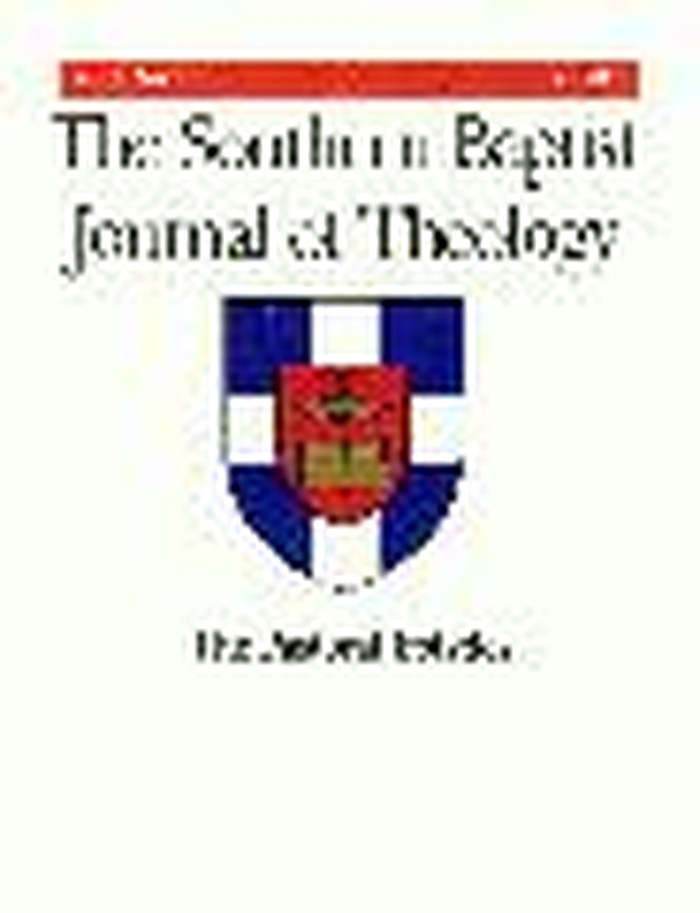Pastoral Epistles' Relevance is Theology Journal's Focus
- David Roach Baptist Press
- Published Nov 25, 2003

Instructions for ministry in a postmodern culture as gleaned from the Pastoral Epistles -- 1 Timothy, 2 Timothy and Titus -- are the focus of the latest Southern Baptist Journal of Theology, published by Southern Baptist Theological Seminary.
"It is safe to say that the issue of 'truth' has fallen on hard times in our day," writes Stephen Wellum, SBJT editor and associate professor of Christian theology at the Louisville, Ky., campus.
"Living in what has been dubbed a 'postmodern' culture, people are quite skeptical about the human ability to know the truth. ... [W]e are told on every side that we must respect and tolerate everyone's viewpoint as equal no matter what it may be."
Wellum argues, however, that the postmodern rejection of truth poses a dangerous challenge to the Christian Gospel, which insists on the existence of objective and universal truth.
"A helpful antidote to help the church avoid the relativistic tendencies of our postmodern age is the Pastoral Epistles," Wellum writes. "Often neglected in the life of today's church, the Pastorals are a necessary corrective and reminder for the contemporary church as to the need, urgency and privilege of standing firm for the Gospel."
Wellum is one of five authors who tackle various issues related to the Pastoral Epistles. The others are Andreas Kostenberger, Ray Van Neste, Benjamin Merkle and Philip Towner. The journal also includes articles by Paul Helseth and Michael Haykin.
The writers note that students of the Pastoral Epistles will face several interpretive challenges. Kostenberger, professor of New Testament and Greek at Southeastern Baptist Theological Seminary, describes one such challenge as distinguishing between general principles in the Pastorals and specific applications that Paul intended solely for his first-century readers.
"In the case of widows, for example, the general norm is that the church care for widows who have no other means of support," Kostenberger writes. "This applies in Paul's day as well as in ours. In Paul's day, the specific application was for widows over sixty years of age to be up on a list. While the church's outworking of the general scriptural norm may be different today, the norm still applies."
One area where the Pastorals are immediately relevant is their discussion of church leadership, Kostenberger points out. First Timothy provides particularly clear insight into the biblical pattern of church polity, he writes.
Though some contend the church should be governed by a hierarchy of leadership where elders or bishops rule over local church overseers, Kostenberger argues that "closer scrutiny reveals that the Pastorals do not in fact conform to this model but rather display a synonymous usage of the terms 'overseer' (episkopos) and 'elder' (presbyteros) as referring to one and the same office."
Van Neste, director of the Center for Biblical Studies at Union University, presents an overview of Titus, explaining the book's structure and usefulness for the Christian life.
"This letter summarizes the essence of the Christian life, particularly with a view to what the Christian community, the church, is to do," Van Neste writes. "Indeed, I believe the letter to Titus is a tract for our times, and the church today bears the marks of having neglected its message."
Van Neste highlights four key issues discussed in Titus: proper leadership in the church, proper discipline, proper living and proper doctrine. Titus instructs leaders to refute error in order to protect Christians from false teachings that lead to ungodly practices, Van Neste notes.
"The church needs elders who can refute error precisely because there are some in the church already who are teaching falsely and are thereby upsetting entire households," Van Neste writes. "... The situation is urgent. What is at stake is not merely some minor interpretation but the souls of men."
Merkle, a Southern Ph.D. graduate who currently teaches in Southeast Asia, discusses the biblical model of church leadership according to the Pastoral Epistles.
"Does the biblical model include pastors, senior pastors, elders, overseers, bishops, archbishops, and popes?" Merkle asks in his essay. "Based on the evidence from the Pastoral Epistles it will be shown that besides the office of deacon, there is only one other New Testament church office -- that is, the office of pastor, elder, or overseer."
Many argue that the Bible advocates a hierarchy of leadership, which includes both overseers, or bishops, and elders, Merkle explains. But he denies such a distinction, arguing instead that there are "compelling reasons for equating the offices of elder and overseer."
"If overseer and elder are two separate offices, it is strange that Paul never mentions the qualifications of elders in 1 Timothy, especially since the character of the one who is to fill the office of elder is so important," Merkle writes. "If elder is a distinct office from overseer, it would seem that qualifications would be clearly stated for such an important position."
Towner, translation consultant for the United Bible Societies, notes the command in 1 Timothy 4:13 to pay attention to "the public reading of Scripture." He argues that the command stems from the Jewish tradition of reading in the synagogues but still has relevance for Christians.
"There is little doubt that the formative background of the activity enjoined in 1 Timothy 4:13 is the practice in Judaism of public Scripture readings in the synagogue," Towner writes. "... But the close relationship between worship in the synagogue and the worship of the early Christians, especially in the Diaspora, clearly explains the reference to the practice in a Christian document in a way that implies that it was a standard feature of worship."
Public Scripture readings remind Christians of God's mighty acts and of their relationship with God, Towner writes.
He concludes, "The lesson to be learned from 1 Timothy 4:13, and the background that informs the exegesis of this text, is that the deliberate public reading of Scripture ... is one way of rehearsing the acts of God in behalf of his people and his creation and finding and renewing our identity-center in that story over and over again."
Visit Baptist Press on the web



















